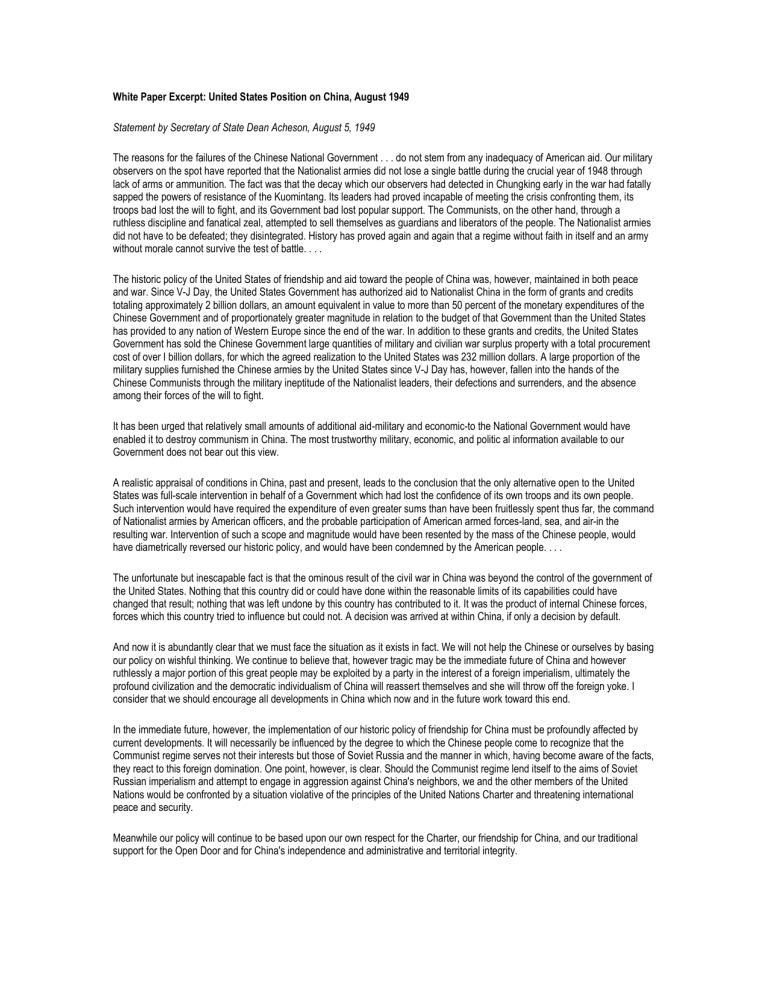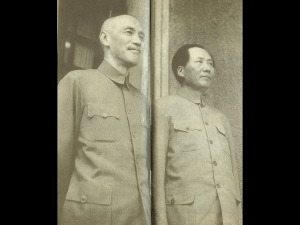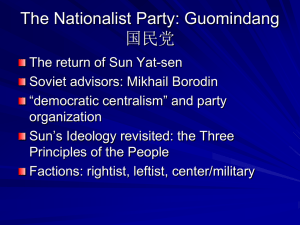White Paper Excerpt: United States Position on China, August 1949

White Paper Excerpt: United States Position on China, August 1949
Statement by Secretary of State Dean Acheson, August 5, 1949
The reasons for the failures of the Chinese National Government . . . do not stem from any inadequacy of American aid. Our military observers on the spot have reported that the Nationalist armies did not lose a single battle during the crucial year of 1948 through lack of arms or ammunition. The fact was that the decay which our observers had detected in Chungking early in the war had fatally sapped the powers of resistance of the Kuomintang. Its leaders had proved incapable of meeting the crisis confronting them, its troops bad lost the will to fight, and its Government bad lost popular support. The Communists, on the other hand, through a ruthless discipline and fanatical zeal, attempted to sell themselves as guardians and liberators of the people. The Nationalist armies did not have to be defeated; they disintegrated. History has proved again and again that a regime without faith in itself and an army without morale cannot survive the test of battle. . . .
The historic policy of the United States of friendship and aid toward the people of China was, however, maintained in both peace and war. Since V-J Day, the United States Government has authorized aid to Nationalist China in the form of grants and credits totaling approximately 2 billion dollars, an amount equivalent in value to more than 50 percent of the monetary expenditures of the
Chinese Government and of proportionately greater magnitude in relation to the budget of that Government than the United States has provided to any nation of Western Europe since the end of the war. In addition to these grants and credits, the United States
Government has sold the Chinese Government large quantities of military and civilian war surplus property with a total procurement cost of over I billion dollars, for which the agreed realization to the United States was 232 million dollars. A large proportion of the military supplies furnished the Chinese armies by the United States since V-J Day has, however, fallen into the hands of the
Chinese Communists through the military ineptitude of the Nationalist leaders, their defections and surrenders, and the absence among their forces of the will to fight.
It has been urged that relatively small amounts of additional aid-military and economic-to the National Government would have enabled it to destroy communism in China. The most trustworthy military, economic, and politic al information available to our
Government does not bear out this view.
A realistic appraisal of conditions in China, past and present, leads to the conclusion that the only alternative open to the United
States was full-scale intervention in behalf of a Government which had lost the confidence of its own troops and its own people.
Such intervention would have required the expenditure of even greater sums than have been fruitlessly spent thus far, the command of Nationalist armies by American officers, and the probable participation of American armed forces-land, sea, and air-in the resulting war. Intervention of such a scope and magnitude would have been resented by the mass of the Chinese people, would have diametrically reversed our historic policy, and would have been condemned by the American people. . . .
The unfortunate but inescapable fact is that the ominous result of the civil war in China was beyond the control of the government of the United States. Nothing that this country did or could have done within the reasonable limits of its capabilities could have changed that result; nothing that was left undone by this country has contributed to it. It was the product of internal Chinese forces, forces which this country tried to influence but could not. A decision was arrived at within China, if only a decision by default.
And now it is abundantly clear that we must face the situation as it exists in fact. We will not help the Chinese or ourselves by basing our policy on wishful thinking. We continue to believe that, however tragic may be the immediate future of China and however ruthlessly a major portion of this great people may be exploited by a party in the interest of a foreign imperialism, ultimately the profound civilization and the democratic individualism of China will reassert themselves and she will throw off the foreign yoke. I consider that we should encourage all developments in China which now and in the future work toward this end.
In the immediate future, however, the implementation of our historic policy of friendship for China must be profoundly affected by current developments. It will necessarily be influenced by the degree to which the Chinese people come to recognize that the
Communist regime serves not their interests but those of Soviet Russia and the manner in which, having become aware of the facts, they react to this foreign domination. One point, however, is clear. Should the Communist regime lend itself to the aims of Soviet
Russian imperialism and attempt to engage in aggression against China's neighbors, we and the other members of the United
Nations would be confronted by a situation violative of the principles of the United Nations Charter and threatening international peace and security.
Meanwhile our policy will continue to be based upon our own respect for the Charter, our friendship for China, and our traditional support for the Open Door and for China's independence and administrative and territorial integrity.







